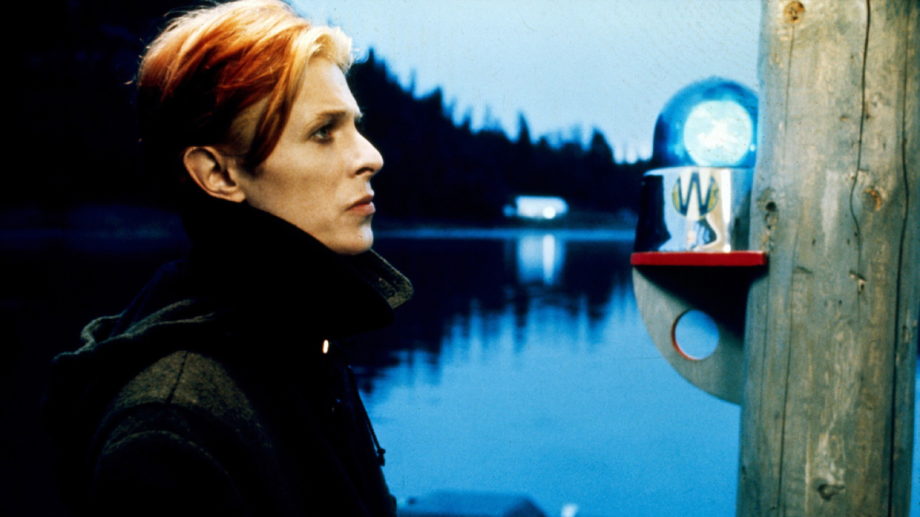I’ll wager that if you ask 100 people, “what does ‘David Bowie’ mean to you?,” 100 out of 100 people think of his music. And why not? This is a man who, arguably, has turned out more “classic” albums than any other artist (writer’s admission: I am a fanatic) and whose recent album The Next Day, his first in 10 years, is among the best reviewed of his 45-year career.
However, if you ask those same 100 people to name 5 David Bowie films, I wouldn’t be surprised if 90 of them said, “David Bowie acts?” Well yes, yes he does, and often very well, in fact.
While there have, indeed, been plenty of music stars who dabble in acting (Mick Jagger, Sting, Jon Bon Jovi), a few actors who play at being musicians (Bruce Willis, Kevin Costner, Eddie Murphy), and a few genuine double threats (Frank Sinatra, Bing Crosby, Elvis Presley, Will Smith), you’d be hard-pressed to find someone who is as big a rock star as Bowie (or even close), who also has a career as an actor and is as criminally underrated in the role as Bowie.

Merry Christmas, Mr. Lawrence. Photo courtesy of The Kobal Collection.
Of course, I don’t mean to imply that he’s always good or that the films themselves are without fault. He isn’t and they most certainly are not. His cameo in David Lynch’s Twin Peaks: Fire Walk With Me, for example, was accompanied by the most absurd Southern accent this side of, well, his Southern accent in Il mio West, and while The Linguini Incident boasts a great cast and some truly bizarre moments, it’s not what anyone might call a good film.
Bowie’s been very stealthy as a film, TV and stage actor, quietly building a résumé that includes a lead or two, along with many supporting roles and cameos, with some magnificent collaborators. Since his lead feature debut in Nicolas Roeg’s The Man Who Fell to Earth, Bowie has had roles of varying sizes in 17 features and has worked with a startlingly diverse group of directors, including Martin Scorsese, Nicolas Roeg, David Lynch, Luc Besson, Nagisa Oshima, Tony Scott, John Landis, Jim Henson, Julian Schnabel, and Christopher Nolan. He has played an alien, Pontius Pilate, Andy Warhol, Nikola Tesla, a doomed vampire, a goblin king, a hit man, a London gangster, a WW2 prisoner of war and, in one truly odd (and un-credited) cameo, a gay shark. He also had a very well received three-month Broadway run as John Merrick in Bernard Pomerance’s The Elephant Man in the winter of 1980-81.
As for co-stars, his film and TV scene mates have included Catherine Deneuve and Susan Sarandon (The Hunger); Tom Conti, Takeshi Kitano, and Ryuichi Sakamoto (Merry Christmas, Mr. Lawrence); Kim Novak and (in her final role) Marlene Dietrich (Just a Gigolo); Dennis Hopper and Jeffrey Wright (Basquiat); Harvey Keitel (Il mio West); Willem Dafoe (The Last Temptation of Christ); Rip Torn, Candy Clark and Buck Henry (The Man Who Fell to Earth); Henry again, André Gregory and Rosanna Arquette (The Linguini Incident); Jeff Goldblum and Michelle Pfeiffer (Into the Night); Jennifer Connolly (Labyrinth); Hugh Jackman (The Prestige); Brian Benben, Tom Beringer, Mimi Rogers, and Eva Gabor (!) (Dream On); Rickey Gervais (Extras), Giovanni Ribisi (The Hunger TV series); and Madeline Kahn and Eric Idle (Yellowbeard, as the aforementioned shark).
One thing that has served David Bowie well is that he’s a perfectionist. He doesn’t half-ass anything. He may fail, but he’s not going to fail by being lazy. He’s a rather accomplished painter and, should he have tried, I am rather confident he would have been an exceptional architect, novelist, photographer, or poet. He’s just one of those people who is an artist, full stop.
The problem we fans have with artists who are rightly acclaimed as geniuses in one medium and show glimpses of real talent in another (and yet a third, as it turns out with Bowie) is that we want more. Sure, there’s a real theatrical bent to much of Bowie’s live music—each part of his career is often referred to as a “character” or a role, but they’re still rooted in music and I can’t help but think “what if” when it comes to his acting. Imagine him as the MC in Cabaret, for example.
That’s an easy one, though. What about comedy? Well, what about it? Here he is as the absurdly named film director Sir Roland Moorecock in HBO’s early 90s sitcom, Dream On. It’s genuinely funny and he chews scenery with the best of them.
We wouldn’t feel this way, that we’ve been cheated out of “the full Bowie,” if he were consistently (or even often) terrible, but he’s not. Even in generally forgettable projects, he tends to make the most of it. I saw the 1990 film Mr. Rice’s Secret at some festival or other simply because David Bowie was in it. It was basically an after school special, rather unsubtle and maudlin, but he pulled it off. Perhaps that’s Bowie’s secret: He doesn’t act often enough to become jaded. He never phones it in.
How does he choose his roles? He has claimed the director has a lot to do with it, but that can’t really apply to every role, so what is it? To be honest, I’m okay with not knowing, but I certainly hope I have a few more chances to wonder. The bottom line is that David Bowie does everything on his own terms and, while I’m sure many of us would love to see him act more and record more and tour again (please?), maybe it’s better this way. When artists open the doors and let everyone in, they take away some of the mystery behind the art and, while I think I have some inking of what drives him, I’m okay not really knowing why Bowie does what Bowie does.
Bonus Watching:



